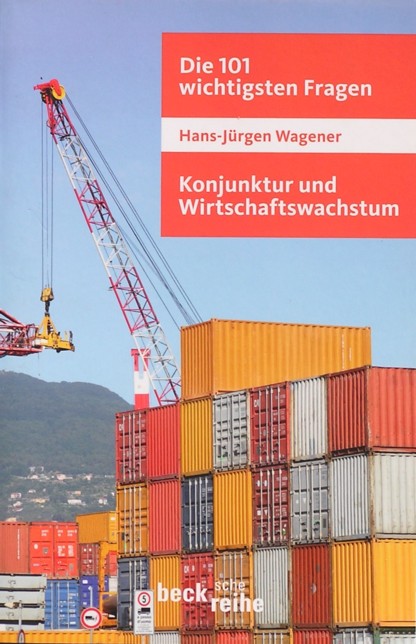

The book Konjunktur und Wirtschaftswachstum with as subtitle Die 101 wichtigsten Fragen by Hans-Jürgen Wagener is not a masterpiece. But yet it is sufficiently original and instructive for reviewing it on this portal. Besides, the theme of the economic dynamics (economic growth and business cycles) has been central in the economic science of the twentieth century. For more than a century the brightest minds have studied the question how welfare is created, and what is the cause of the periodic crises. Wagner succeeds well in avoiding the difficult theories, and in explaining the present knowledge in an easily accessible story. It is commendable, that he pays in particular attention to the social and institutional causes behind the economic developments.
Again, the book is structured well. Wagner begins with a definition of the concept of welfare. He connects it to the national wealth, and dives deep in human history. For instance, he compares the economic growth since the year 1000 (!) of Europe and China. He studies the decisive factors behind growth. He also investigates the role of the social institutions in the development. Besides, Wagner shows how the national culture affects the willingness of the people to undertake and to act. Subsequently, he studies the economics of development, and tries to discover its logic. Finally, he reflects on the most probable path, that the global economy will follow in the future.
The subtitle Die 101 wichtigsten Fragen refers to the grouping in the book. Namely, Wagener has divided the text into 101 paragraphs, which each elaborate on a certain problem. Fortunately, this does not lead to a fragmentation of the text, and the leading thread of the story always remains clearly discernible. The problems are interesting enough, for instance: is egoism the basis of our economic system? Does an islamic economy exist? Does moderating the conjuncture really work? Does growing grey have advantages for the population? Does more make happier? What does management actually do?1 Why are there poor states? Can growth be planned? Can life simply continue? Or is change necessary? The reader understands, that Wagener does not shun the important questions of life, and is perhaps interested in the answers that he offers.
And it must be said: as far as your reviewer can judge, the answers always go to the heart of the matter. Wagener is an objective thinker, positioned somewhere in the middle of the political spectrum (say christian-democracy), and gives proof of common sense. Perhaps that is a bit boring, but thus his arguments are on solid grounds. And the many facts add value. Do you know that the word pecunia stems from pecus (cattle)? And that the present city of Berlin produces 23 times as much as once the ancient Rome? Wagener is not afraid to clearly analyze the causes behind the popular growth, with an intermezzo to the anthropology. He concludes with some surprise, that nowadays economic growth occurs without democracy (among others in China)2. The reader must accept, as a concession to this erudition, that Wagener shows his appreciation for Siemens, Krupp, Rockefeller and Gates (p.73).
A sufficient entrepreneurial freedom is essential3. People must feel motivated to take risks. Wagener is critical about economic planning. He advocates a social market economy with regulated markets. The Scandinavian model has his personal preference. It is curious that in this system he attaches value to religion (p.89). Incidentally, in protestantism the people want to read the Bible by themselves, which reduced analphabetism (p.100). Reversely, Wagener abhors the Indian caste system, which chains man. And perhaps the Dutch radicalism during the seventies is due to the incomes from natural gas. Nowadays economic networks become more and more important. They can only function, when a sound legal system is present.
Much attention is obviously paid to the state policy. According to Wagener it must be restricted to the order, infrastructure, and education. State support for enterprises is often hurtful, especially because the state has difficulty in "dropping losers" (p.132). The European policy of industrialization directly after the Second Worldwar became a disappointment. In the end, Wagener is hopeful, because in Europe the social race to the bottom does not occur, He pleads in favour of a significant global equality. That is a nice ending of the book, which disappoints nowhere, although Wagener is sometimes speculative. Those who study this authentic book, obtain a solid foundation and no longer need to shun the economic debate.